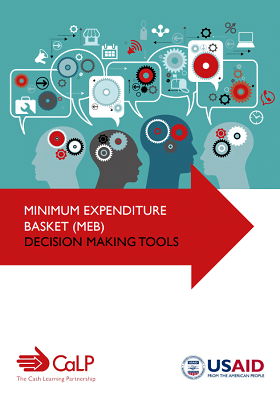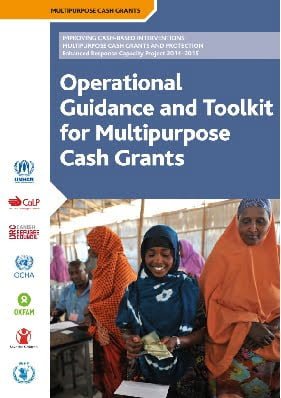Multipurpose Cash Assistance
Multipurpose Cash (MPC) are unrestricted cash transfers that people affected by crises can use to cover their basic needs. By its nature, MPC is the assistance modality which offers people a maximum degree of choice, flexibility and dignity. There is also growing evidence that it is more cost-efficient and cost-effective to meet multiple needs.
But this requires new ways of collaborating between humanitarian actors, at all stages of the program cycle, and across sectors. While solid tools exist to support collaboration, they have not been widely adopted and MPC is still used in an ad-hoc way. Challenges remain to be addressed if we are to successfully fit MPC into the humanitarian system.
Featured content

Multipurpose cash outcome indicators and guidance
Guidelines and Tools
The indicators in this document, developed by the Grand Bargain Cash Workstream, focus on the primary objectives of humanitarian Multipurpose Cash Assistance (MPC), and the outcomes to which MPC can most strongly contribute in a given context.

Minimum Expenditure Basket (MEB) Decision Making Tools
Guidelines and Tools
Update: This publication was revised in 2022. Please read the revised publication here.
The purpose of this tipsheet is to accompany practitioners and decision makers through key stages in the process of calculating an MEB to: (a)
identify what is the most appropriate path to take in relation to their
particular context, identified objective, existing capacities and available
resources; and...

Operational Guidance and Toolkit for Multipurpose Cash Grants
Guidelines and Tools
This operational guidance and toolkit brings together worldwide expertise on cash-based interventions (CBIs). It provides comprehensive and practical guidance for humanitarian actors to assess the feasibility, conceptualise the design and structure the implementation of MPGs. The guidance focuses on MPGs whose primary objective is to meet basic needs as defined by affected people...

Definition of Minimum Expenditure Baskets (MEB) in West Africa
Report
Throughout 2017, five countries in West Africa have worked collectively to define minimum expenditure baskets, in order to better capture the contribution that humanitarian assistance is making to address the basic needs of affected populations, and improve the impact of assistance. This heavy process raises technical and coordination challenges. The CALP Network, with support from USAID /...
Thematic lead
Latest
No results found
There is no content available at this time.




